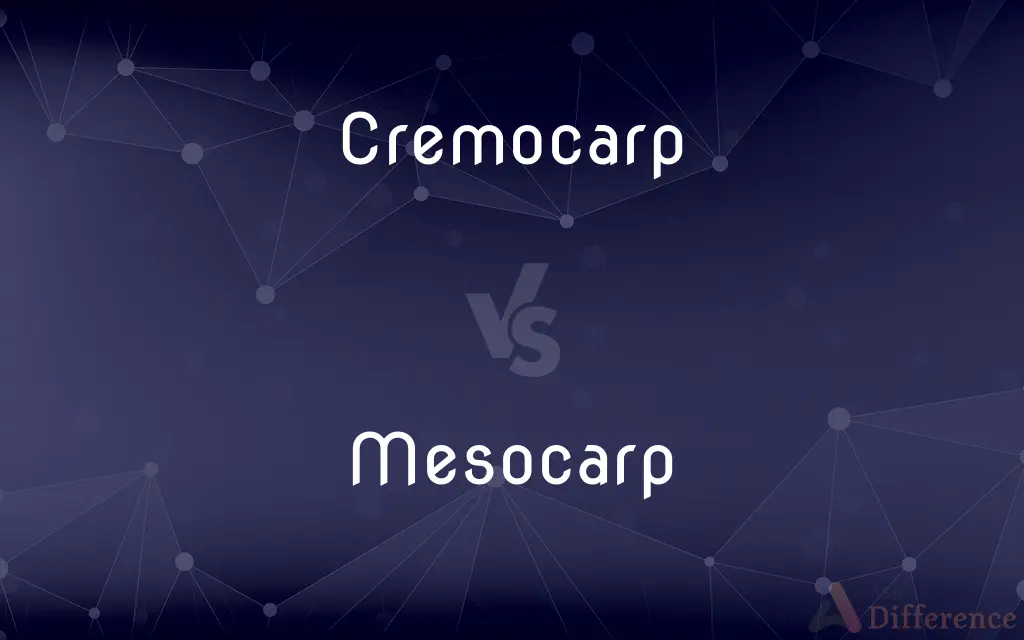Cremocarp vs. Mesocarp — What's the Difference?
By Tayyaba Rehman — Updated on October 16, 2023
The "Cremocarp" is the split fruit of plants from the Apiaceae family, while the "Mesocarp" refers to the middle layer of fruit tissue, generally the fleshy part.

Difference Between Cremocarp and Mesocarp
Table of Contents
ADVERTISEMENT
Key Differences
The term "Cremocarp" relates specifically to the fruit structure of plants from the Apiaceae family. This family, also known as the parsley or carrot family, produces a characteristic split fruit. When mature, the Cremocarp divides into two one-seeded segments, with each of these segments termed a mericarp. On the other hand, the "Mesocarp" is a botanical term that transcends specific plant families. It is used to describe the middle layer of the pericarp (fruit tissue) in fruits, and in many fruits, it's the part that we commonly eat.
Diving deeper into the nature of "Cremocarp," we find its relevance in the identification of species within the Apiaceae family. When botanists or plant enthusiasts examine the fruiting structures of these plants, the Cremocarp provides valuable information. In contrast, the "Mesocarp" is a term applied more broadly across many fruit-bearing plants. Whether you're looking at a peach, mango, or olive, the Mesocarp plays a role, often providing the juicy or fleshy portion of the fruit.
A fascinating feature of the "Cremocarp" is its ability to split into two mericarps upon maturation. This splitting allows for the efficient dispersal of seeds, ensuring the propagation of the plant species. However, the "Mesocarp" does not share this splitting characteristic. Its primary function lies in providing nutrition, protection, or attracting animals for seed dispersal, depending on the type of fruit.
One might argue that the significance of "Cremocarp" and "Mesocarp" lies in their implications for plant reproduction and survival. While the Cremocarp ensures the dissemination of seeds for plants in the Apiaceae family, the Mesocarp, through its appealing taste or texture, encourages animals to eat the fruit and, in doing so, helps in seed dispersal for many plants.
Comparison Chart
Definition
Split fruit of plants from the Apiaceae family.
Middle layer of fruit tissue, often the fleshy part.
ADVERTISEMENT
Associated with
Apiaceae family (e.g., parsley, carrot).
Various fruits across different families.
Function
Splits into mericarps for seed dispersal.
Provides nutrition, protection, or aids in seed dispersal.
Relevance
Identification within the Apiaceae family.
Describing the structure of many fruits.
Role in Reproduction
Efficient dispersal of seeds.
Attracting animals for seed dispersal, depending on the fruit.
Compare with Definitions
Cremocarp
Divides into two mericarps upon maturation.
Upon drying, the Cremocarp split, revealing two mericarps.
Mesocarp
Often the edible part of the fruit.
The sweet taste of the mango comes primarily from its Mesocarp.
Cremocarp
The split fruit characteristic of the Apiaceae family.
The plant displayed a mature Cremocarp, ready to disperse its seeds.
Mesocarp
Found in various fruits across different botanical families.
Whether examining a peach or a tomato, the Mesocarp plays a significant role in the fruit's structure.
Cremocarp
Essential for the propagation of species in the Apiaceae family.
The Cremocarp's design ensures the continued survival of these plant species.
Mesocarp
The middle layer of the pericarp in fruits.
In many fruits, the Mesocarp offers a delicious, juicy bite.
Cremocarp
Provides insights for plant identification within Apiaceae.
The structure of the Cremocarp confirmed its classification within the parsley family.
Mesocarp
Serves as protection or nutrition for the seeds.
The Mesocarp of the olive surrounds the pit, giving it a protective cushion.
Cremocarp
A dry fruit type that does not split open to release seeds.
Unlike some fruits, the Cremocarp remains intact, with seeds nestled inside.
Mesocarp
Can assist in seed dispersal by attracting animals.
Birds are drawn to berries due to their fleshy Mesocarp.
Cremocarp
(botany) The fruit of fennel, carrot, parsnip, etc., consisting of a pair of carpels pendent from a supporting axis.
Mesocarp
The middle, usually fleshy layer of a fruit wall.
Cremocarp
The peculiar fruit of fennel, carrot, parsnip, and the like, consisting of a pair of carpels pendent from a supporting axis.
Mesocarp
(botany) The middle layer of the pericarp of a fruit. In many fruits such as drupes and tomatoes, the mesocarp is fleshy
Mesocarp
The middle layer of a pericarp which consists of three distinct or dissimilar layers.
Mesocarp
The middle layer of a pericarp
Common Curiosities
Why does the Cremocarp split?
The Cremocarp splits to disperse its seeds efficiently.
Is the Mesocarp always edible?
While the Mesocarp is often edible, it isn't always the case, depending on the fruit.
Which part of the fruit is the Mesocarp?
The Mesocarp is the middle layer of the fruit, often the fleshy and edible part.
Which plants produce a Cremocarp?
Plants from the Apiaceae family, like parsley and carrot, produce Cremocarps.
What is a Cremocarp?
Cremocarp is the fruit of plants from the Apiaceae family that splits into two segments upon maturation.
Does every fruit have a Mesocarp?
Most fruits have a Mesocarp, but its prominence and characteristics vary across species.
How is a Cremocarp different from a regular fruit?
A Cremocarp is specific to the Apiaceae family and splits into two mericarps upon maturation.
What is the function of the Mesocarp?
The Mesocarp provides nutrition, protection, or aids in seed dispersal, depending on the type of fruit.
Share Your Discovery

Previous Comparison
Act vs. Conduct
Next Comparison
Lift vs. RaiseAuthor Spotlight
Written by
Tayyaba RehmanTayyaba Rehman is a distinguished writer, currently serving as a primary contributor to askdifference.com. As a researcher in semantics and etymology, Tayyaba's passion for the complexity of languages and their distinctions has found a perfect home on the platform. Tayyaba delves into the intricacies of language, distinguishing between commonly confused words and phrases, thereby providing clarity for readers worldwide.
















































